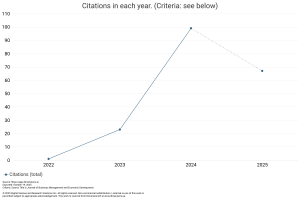Strategic Leadership in Digital Transformation: Organizational Capabilities and Performance Outcomes
DOI:
https://doi.org/10.59653/jbmed.v3i03.1938Keywords:
strategic leadership, digital transformation, organizational capabilities, performance outcomes, competitive advantage, change management, digital strategyAbstract
Digital transformation has emerged as a critical imperative for organizations seeking to maintain competitive advantage in an increasingly digital economy. This study examines the role of strategic leadership in driving successful digital transformation initiatives and their impact on organizational capabilities and performance outcomes. Through a comprehensive analysis of existing literature and theoretical frameworks, this research explores how strategic leaders navigate the complexities of digital transformation, develop necessary organizational capabilities, and achieve superior performance outcomes. The study reveals that strategic leadership plays a pivotal role in orchestrating digital transformation through vision articulation, resource allocation, culture transformation, and capability building. Organizations with effective strategic leadership in digital transformation demonstrate enhanced innovation capabilities, improved operational efficiency, better customer engagement, and superior financial performance. The findings suggest that strategic leaders must adopt a holistic approach that integrates technological advancement with organizational change management, talent development, and cultural transformation. This research contributes to the growing body of knowledge on digital transformation leadership and provides practical insights for executives leading digital initiatives in their organizations.
Downloads
References
Bass, B. M. (1990). Bass & Stogdill's handbook of leadership: Theory, research, and managerial applications (3rd ed.). Free Press.
Bharadwaj, A., El Sawy, O. A., Pavlou, P. A., & Venkatraman, N. (2013). Digital business strategy: Toward a next generation of insights. MIS Quarterly, 37(2), 471-482.
Bouée, C. E., & Schaible, S. (2015). Die digitale Transformation der Industrie. Roland Berger Strategy Consultants.
Bughin, J., Catlin, T., Hirt, M., & Willmott, P. (2018). Why digital strategies fail. McKinsey Quarterly, 1, 1-6.
Chan, C. M., Teoh, S. Y., Yeow, A., & Pan, G. (2019). Agility in responding to disruptive digital innovation: Case study of an SME. Information Systems Journal, 29(2), 436-455.
Cho, J., Bian, Y., & Lee, J. (2023). Leading digital business model transformation in the K-pop industry: the case of SM Entertainment. Asia Pacific Business Review, 29(5). https://doi.org/10.1080/13602381.2023.2229761
Dubey, R., Bryde, D. J., Blome, C., Dwivedi, Y. K., Childe, S. J., & Foropon, C. (2024). Alliances and digital transformation are crucial for benefiting from dynamic supply chain capabilities during times of crisis: A multi-method study. International Journal of Production Economics, 269. https://doi.org/10.1016/j.ijpe.2024.109166
Fitzgerald, M., Kruschwitz, N., Bonnet, D., & Welch, M. (2014). Embracing digital technology: A new strategic imperative. MIT Sloan Management Review, 55(2), 1-12.
Gartner, Inc. (2019). Gartner survey shows 37% of organizations have implemented AI in some form. Press Release.
Gilli, K., Lettner, N., & Guettel, W. (2024). The future of leadership: new digital skills or old analog virtues? Journal of Business Strategy, 45(1). https://doi.org/10.1108/JBS-06-2022-0093
Helfat, C. E., & Martin, J. A. (2015). Dynamic managerial capabilities: Review and assessment of managerial impact on strategic change. Journal of Management, 41(5), 1281-1312.
Henderikx, M., & Stoffers, J. (2022). An Exploratory Literature Study into Digital Transformation and Leadership: Toward Future-Proof Middle Managers. In Sustainability (Switzerland) (Vol. 14, Issue 2). https://doi.org/10.3390/su14020687
Henriette, E., Feki, M., & Boughzala, I. (2016). Digital transformation challenges and opportunities: The case of the Tunisian tourism sector. International Journal of Computer Science Issues, 13(6), 66-72.
Hess, T., Matt, C., Benlian, A., & Wiesböck, F. (2016). Options for formulating a digital transformation strategy. MIS Quarterly Executive, 15(2), 123-139.
Heubeck, T. (2023). Managerial capabilities as facilitators of digital transformation? Dynamic managerial capabilities as antecedents to digital business model transformation and firm performance. Digital Business, 3(1). https://doi.org/10.1016/j.digbus.2023.100053
Ismail, M. H., Khater, M., & Zaki, M. (2017). Digital business transformation and strategy: What do we know so far? Cambridge Service Alliance, 10, 1-35.
Kane, G. C., Phillips, A. N., Copulsky, J., & Andrus, G. (2019). The technology fallacy: How people are the real key to digital transformation. MIT Press.
Karimi, J., & Walter, Z. (2015). The role of dynamic capabilities in responding to digital disruption: A factor-based study of the newspaper industry. Journal of Management Information Systems, 32(1), 39-81.
Karippur, N. K., & Balaramachandran, P. R. (2022). Antecedents of Effective Digital Leadership of Enterprises in Asia Pacific. Australasian Journal of Information Systems, 26. https://doi.org/10.3127/ajis.v26i0.2525
Li, L., Su, F., Zhang, W., & Mao, J. Y. (2018). Digital transformation by SME entrepreneurs: A capability perspective. Information Systems Journal, 28(6), 1129-1157.
Matt, C., Hess, T., & Benlian, A. (2015). Digital transformation strategies. Business & Information Systems Engineering, 57(5), 339-343.
McKenzie, C., Brophy, K., Konstanta, G., & Webster, L. (2023). A vision for change leadership: Trust, transparency and accountability at University of Wollongong Library. Journal of Academic Librarianship, 49(3). https://doi.org/10.1016/j.acalib.2023.102710
McKinsey Global Institute. (2018). Notes from the AI frontier: Modeling the impact of AI on the world economy. McKinsey & Company.
Nambisan, S., Lyytinen, K., Majchrzak, A., & Song, M. (2017). Digital innovation management: Reinventing innovation management research in a digital world. MIS Quarterly, 41(1), 223-238.
Navaridas-Nalda, F., Clavel-San Emeterio, M., Fernández-Ortiz, R., & Arias-Oliva, M. (2020). The strategic influence of school principal leadership in the digital transformation of schools. Computers in Human Behavior, 112. https://doi.org/10.1016/j.chb.2020.106481
Philip, J. (2021). Viewing Digital Transformation through the Lens of Transformational Leadership. Journal of Organizational Computing and Electronic Commerce, 31(2). https://doi.org/10.1080/10919392.2021.1911573
Reuter, E., & Floyd, S. (2024). Strategic leaders’ ecosystem vision formation and digital transformation: A motivated interactional lens. Strategic Entrepreneurship Journal, 18(1). https://doi.org/10.1002/sej.1493
Rogers, D. L. (2016). The digital transformation playbook: Rethink your business for the digital age. Columbia University Press.
Schwertner, K. (2017). Digital transformation of business. Trakia Journal of Sciences, 15(1), 388-393.
Sebastian, I., Ross, J., Beath, C., Mocker, M., Moloney, K., & Fonstad, N. (2017). How big old companies navigate digital transformation. MIS Quarterly Executive, 16(3), 197-213.
Senadjki, A., Au Yong, H. N., Ganapathy, T., & Ogbeibu, S. (2024). Unlocking the potential: the impact of digital leadership on firms’ performance through digital transformation. Journal of Business and Socio-Economic Development, 4(2). https://doi.org/10.1108/JBSED-06-2023-0050
Singh, A., & Hess, T. (2017). How chief digital officers promote the digital transformation of their companies. MIS Quarterly Executive, 16(1), 1-17.
Singh, A., Lim, W. M., Jha, S., Kumar, S., & Ciasullo, M. V. (2023). The state of the art of strategic leadership. Journal of Business Research, 158. https://doi.org/10.1016/j.jbusres.2023.113676
Teece, D. J. (2007). Explicating dynamic capabilities: The nature and microfoundations of (sustainable) enterprise performance. Strategic Management Journal, 28(13), 1319-1350.
Vial, G. (2019). Understanding digital transformation: A review and a research agenda. Journal of Strategic Information Systems, 28(2), 118-144.
Wade, M., & Hulland, J. (2004). The resource-based view and information systems research: Review, extension, and suggestions for future research. MIS Quarterly, 28(1), 107-142.
Westerman, G., Bonnet, D., & McAfee, A. (2014). Leading digital: Turning technology into business transformation. Harvard Business Review Press.
Yao, Q., Tang, H., Liu, Y., & Boadu, F. (2024). The penetration effect of digital leadership on digital transformation: the role of digital strategy consensus and diversity types. Journal of Enterprise Information Management, 37(3). https://doi.org/10.1108/JEIM-09-2022-0350
Yoo, Y., Henfridsson, O., & Lyytinen, K. (2010). Research commentary: The new organizing logic of digital innovation. Information Systems Research, 21(4), 724-735.
Downloads
Published
How to Cite
Issue
Section
License
Copyright (c) 2025 Mokhamad Yaurizqika Hadi

This work is licensed under a Creative Commons Attribution-ShareAlike 4.0 International License.
Authors who publish with this journal agree to the following terms:
- Authors retain copyright and grant the journal right of first publication with the work simultaneously licensed under a Creative Commons Attribution-ShareAlike that allows others to share the work with an acknowledgement of the work's authorship and initial publication in this journal.
- Authors are able to enter into separate, additional contractual arrangements for the non-exclusive distribution of the journal's published version of the work (e.g., post it to an institutional repository or publish it in a book), with an acknowledgement of its initial publication in this journal.
- Authors are permitted and encouraged to post their work online (e.g., in institutional repositories or on their website) prior to and during the submission process, as it can lead to productive exchanges, as well as earlier and greater citation of published work (See The Effect of Open Access).





























